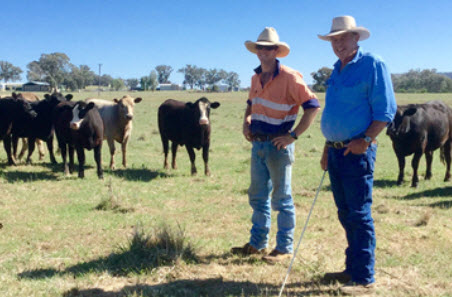Prime pastures underpin MSA win

Productive pastures combined with low-stress livestock handling are among the practices a family based at Mebul, NSW credits for their improved compliance rates to MSA specifications.
Angus and Lesley Tink, along with their son Jeff, won the inaugural Progress Award for NSW at the 2017 MSA Excellence in Eating Quality Awards presented at Tamworth in October. The award recognises the producer with the greatest improvement in their MSA results since the 2014–15.
The Tinks sell HGP and antibiotic-free grassfed cattle into the JBS Farm Assurance Program for processing at JBS Australia’s Scone abattoir for the JBS Great Southern brand.
Steers are turned off to target a 370kg dressed weight and heifers between 320–330kg dressed weight. In 2017, the Tinks turned off 340 head for the MSA program.
Taking on feedback
Angus said studying their MSA results and asking questions had also helped in their quest to have all of their cattle meet the MSA requirements.
“I’m a great listener and I’ve asked a lot of questions over the years.
“I study the MSA feedback sheet and always look at individual scores and check the MSA Index per load.
“We became MSA-registered producers many years ago, but we started seriously turning off cattle for the program about six years ago when we sent cattle to supply Woolworths.
“Any cattle that don’t grade MSA means the price can drop 50–70c/kilogram and on a 350kg carcase, that’s quite a big difference – so we do whatever we can to ensure our cattle grade as MSA.”
The Tinks have two properties – 906ha ‘Tarawong’ and 942ha ‘Karuma’, which receive an average annual rainfall of around 660mm.
They run 450 breeders, which are predominantly Angus–Charolais or Angus–Simmental, and use Angus–Simmental–Gelbvieh composite bulls in their breeding program.
Driving improvement
Angus said good pastures and low-stress practices have helped improve their MSA compliance.
The cattle are run on a mix of clover, ryegrass and phalaris-based pastures, and there’s also 200ha of grazing oats.
"A lot of our country is hill country and every two years we undertake an aerial application of single superphosphate fertiliser.
“We ensure cattle are kept in their mobs when they’re in the yards and then transported. We keep our heifers and steers separated all the way through from weaning to the abattoir.
“I think making sure they get to the abattoir in daylight so they can settle helps reduce stress as well.
“When we’re sending cattle, we make sure they’re ready in the yards by 8:30am–9am and load them at about 1pm. It’s only 260km to Scone, so they’re there well before the sun goes down."
The gains
MSA Producer Engagement Officer Jarrod Lees said the Tinks had increased their MSA Index from 49.38 in 2014–15, to 60.98 in 2015–17, and also increased MSA compliance rates from 83% to 89%, which is on par with the national average of 89.2%.
“The Tinks have had seen a huge improvement in the eating quality of their herd as shown by their MSA index results,” Jarrod said.
“The focus on genetics and pasture management is likely to be helping this. That pasture management along with their low-stress handling techniques also looks to have helped them improve their compliance to the MSA pH requirement.
“Keeping animals in separate mobs and minimising handling prior to slaughter will be assisting the improvement in compliance. It’s impressive they pay such attention to their feedback sheets and implement new practices to continue to strive for improvement.
The Tinks were among the 5,118 registered MSA producers in NSW who consigned cattle during 2015–17.
To be eligible for the MSA Excellence in Eating Quality Awards, a producer’s annual MSA-graded volume had to be equal to or above the average volume consigned for the state in which they were produced.
Find out how you can improve compliance with MSA. Go to mla.com.au/msa.



